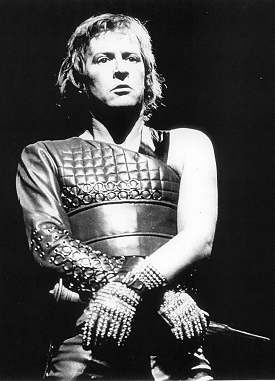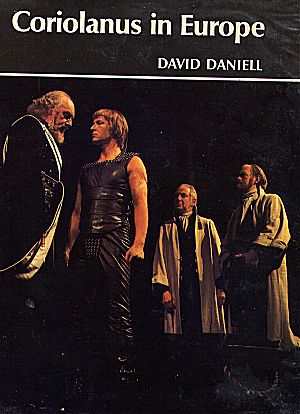|
Alan Howard, described to me by many people I
met on this tour as the finest actor in Europe today, brought to Coriolanus
exceptional powers of physical presence, voice, intelligence, and experience. A
man whose presence can be warm and witty and deeply engaging, he can also be
subject to powerful rages if he feels that anything at all is in any way liable
to interfere with the work of the company in presenting the very best that is
possible. Touring, with its perpetual scramble to get on top of local
difficulties in time, its constant moving out of any sort of familiar nest, is
something very ambivalent for him, for his reception in these weeks in many
European cities, after memories of A Midsummer Night's Dream, and
Henry 5, was something not far short of delirious. He began this tour
justifiably angry about the conditions which modern economics impose on such a
company, arguing passionately on behalf of the RSC backstage staff, for example
that such miracles as they achieved should not have been expected as a matter
of course. (I recall a Paris review of the Peter Brook/Paul Scofield RSC
King Lear some years ago, which congratulated the British Government on
so fully subsidising so magnificent an achievement, the hideous untruth of
which must have caused some teeth to be ground down to the gums.) He was also,
like all of the company, tired. In the eighteen months since the production had
opened at Stratford, he had also played, during eight of those months, almost
without a night off, King Henry in the three Parts of Henry VI,
Antony in Peter Brook's production of Antony and Cleopatra, and Rover in
John O'Keeffe's Wild Oats. To all his parts he brings two personal
qualities - very hard work in preparation, with private research about the part
carried further than is common; and one-hundred-per-cent giving while on the
stage.
Sitting quiet and apart one day, he developed
for me a little of all his understanding of the part of Coriolanus, though he
took considerable pains to make me understand that the result of all his
feelings and thoughts was in the performance - 'I don't write about it. I act
it.' He suggested that the man is a metaphor for Rome. Everyone has an attitude
to him. They all want him to be their Coriolanus. Thus, the Citizens
would love him if only he would pretend to love them, if he would manage
to do his shopping in the same supermarket: Volumnia's attitude is incredible -
'were my son my husband'! Menenius lies about him, is prepared to work away in
the background politically, in order to help the Senate - they have messed
things up with too many concessions, and now want to put a hard man on the
streets, and Menenius has suggested that he is suitable. Virgilia is the only
one who keeps her silence. For the rest, he is the battle-ground for all their
problems, for the arguments between the Senators and the Citizens, between the
Senators and the Tribunes, between his mother and Rome. This understanding, he
said, governed the development of the singing of the word 'voices' in scene 13.
'It was an idea of Terry's. I was already emphasising the word. Terry said,
'Give it onomatopoeic resonance, take it further, make it like a street
vendor.' So Coriolanus would put himself at their disposal, offer himself as
part of the wheeling and dealing that his mother and Menenius have been working
on, to make him Consul.' Everyone wants Coriolanus in his own image; he has to
embody everyone in the play. 'Look in here,' he says, 'I have this thing inside
me, this body politic. I am made up of those elements.' So when he gives up
Rome, he is in a real sense giving himself up. Practically, he is rescuing
Rome, but in the long term he is destroying himself. So the tragedy of
Coriolanus is the tragedy of the whole play. Everyone, Howard felt, had died at
the end to a great extent - 'except possibly the Citizens, who curiously have
learned something, and thus have got something, possibly, out of it.' The
Tribunes are finished. Menenius retires to a small cottage in Essex and grows
geraniums. Aufidius struggles with his memoirs. Virgilia and Volumnia are
destroyed, living together in an empty house. (Menenius and the two women,
however, still have the grandchild.)
|
Howard was unsentimental about Menenius.
Certainly he was not unlike Falstaff, but he related him to the dangerous,
not-so-attractive side of that fat knight, who knew that the Prince of Wales
was becoming the future King. So Menenius, with all that wit and humour, has an
iron fist in his velvet glove - his description of Martius fits himself, 'a
bear indeed that lives like a lamb.' Menenius admits to having lied his head
off in Rome about Caius Martius. He tells the two Volscian sentries, ' Like to
a bowl upon a subtle ground, / I have tumbled past the throw, and in his praise
/ Have almost stamped the leasing' - the 'book of his good acts' has been
'haply amplified'. Yet to Caius his bark is worse than his bite. On 'Down with
that sword' he sees that Caius has a lot of the devil in him, is having a ball,
- is in fact at that moment a big baby. |
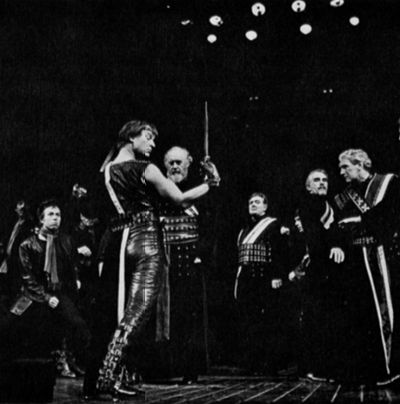 |
But for all that, Howard insisted that an
aspect of Coriolanus is the sheer enjoyment he gets out of physical violence
and killing. He enjoys it, and it is real. At the same time - 'all that funny
stuff when he comes down from Corioles, about the poor man who used him kindly
.... and "then Aufidius was within my view / and wrath o'erwhelmed my pity."
Pity? This is a personal thing for him, the discovery of the possibility
of this in him. It is one of the first human marks in him we see. He's saying,
"I'm not getting weak, am I?" ' It has been said that he is tactless to greet
his wife, on his return, with talk of widows and mothers that lack sons. But
Howard felt that he was greeting her with what was in his mind, what he has
been dealing with. ' Just as the racing-driver's wife must have in mind the
possibility ........ oil and fire, glass, heat and speed: the actual thing
you've been doing must be the thing that's close to you and frightening to you.
It is in fact an added attraction. He doesn't pretend its a bed of roses out
there. From just before the play starts, he is beginning to be something else,
going out into another world, so on "mothers that lacked sons" I played it off
Volumnia.
There are so many fewer opportunities than in
other tragedies for personal soliloquy, he noted: few opportunities where he
expresses his own problem. This he found especially fascinating because of the
use of the 'internal soliloquy' - ' in the middle of the scene he talks to
himself ' as at the start of scene 15 or in the market-place. It is all
inensely personal, and mysterious. It is as if, he felt, through the play
Coriolanus was becoming something that belonged to another world, more, even
than a vampire or a superman: something more like an angel of death. He was
fascinated by Coriolanus' avoidance of a mid point: ' he conceives himself in
some areas to be so mother-dominated, vulnerable but by his standards so much
less - babies, beggars, school-boys, virgins, eunuchs. So his notions of being
something other and unearthly are tempered by these alternatives, ideas of
himself kept within, largely hidden, in order to protect himself from the
implications of such an angel of death.
|
' There is something very macabre and
Jacobean about a lot of the play. Coriolanus is so much more than a bully-boy.
He is in touch with some other state or sphere, and he seems to have a complete
disregard for death. Nobody in this play is killed until the end, and everyone
talks about him. Nowhere in this play does somebody die. It is very weird. The
war at the opening is a strange nightmare. Cominius, hardheaded and rational,
finds that trying to explain this terrible thing that has started to happen
blows his mind, as if almost he were describing a Dracula or a Satan. There is
a whole area in the play expressing a power above the normal, growing. In that
moment with his mother when she asks him to lie down he knows that it is the
beginning of the end. The truth is in the things he doesn't say. He simply
recognises this end, as it were of the process, the ' inevitable strokes ' that
it is ' fond to wail .... As 'tis to laugh.' |
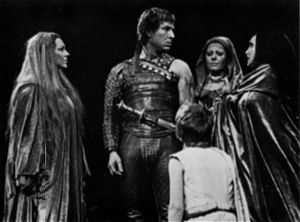 |
' The recognition that there is Providence in
the fall of the sparrow - once that is known, then ..... pouf. At
Holds her by the hand silent, he is reconciled to her, takes her to him,
makes it happen, but now a line or two later, on "But let it come" he belongs
elsewhere.' He pointed out the Shakespearean three words, 'Ripeness is all',
'The readiness is all', 'let it come' with which tragedy moves into another
realm; the hero is beyond moral consideration, and moving up into the empyrean:
he quoted Christ's, 'Let this cup pass' in Gethsemane.
The play can be so precise, but only Coriolanus
seems to know his way round this pervading mystery of 'elsewhere'. In early
days of rehearsal, apparently, a good deal of time was spent calculating how
fat Antium was from Rome, how long was that exile for which he wanted a kiss of
equal length. Howard, now, was convinced that the 'world elsewhere' was the
'city of kites and crows'. ' He goes into the desert - a natural reminiscence,
possibly, of meeting Satan as Christ did. Everywhere he goes it's scorched
earth, salt, ruined buildings, kites and crows picking off dead bodies. He
says, "I did this". He saw that growing element in the play as connected with
the uncompromising nature of the man. ' He is always Rome's ultimate deterrent.
He always beats the Volscians, always. Now, think what it would have done in
1945 to call an Atom-bomb hero "Mr Hiroshima". What a terrible thing that would
be to be branded with the name of the city you have destroyed, and for ever
after condemned. Worse, society would think in terms of trying to normalise him
by giving standard rewards. A warrior, poet, mathematician, scientist, saint,
martyr, any individual that becomes one of those things but is not satisfied is
like Isaac Newton saying he had found a "a smoother pebble or a prettier shell
than ordinary, while the great ocean of truth lay all undiscovered before me".
Though society says, "You've done it" he has to reply, "I've only just started,
I haven't done anything." Society is not interested in that, and is faced with
the terrible problem of what to do with the hero who won't take any reward. The
normal method of controlling is the Upper Chamber, the Civil List. Supposing
that then he - Mr Hiroshima - won't lie down - the world gets worried. That
uncompromising state will not do. Here is a candidate for a mental home - or a
cross. There is a lot of that in that man under the imagery.'
' The Devil, an Angel of Death made for death,
a dragon or a god - where is he between that and "gracious silence, hail"? He
doesn't want to get involved in all the rabitting and the chat and the
politics: he knows it as a stupid thing - "Don't make me wear that stupid
garment" he says. His tiny encounter with First Citizen in that scene ("The
price is, to ask it kindly") is a sudden understanding between two rude people
for a moment: he is sure of himself. Caius Martius just can't lie. He is one of
the few heroes who simply cannot act - quite unlike Hal or Henry 5 or
Hamlet.'
|
Approaching the end, Howard found
something very strange about being a beggar-man to go muffled to your worst
enemy. Coriolanus, he felt, is by then weary of it all, and he is pretty
confident that Aufidius will finish him - not there and then, but sooner or
later. His impact on Aufidius' household is equally odd. In scene 12, a
Volscian had described him as 'the devil', to which Aufidius had retorted
'Bolder, though not so subtle'. Now in scene 23 there is talk of 'witchcraft'
in him, and the Volscian soldiers use him 'the grace'fore meat'. Yet
Coriolanus' choice has been right, to go to the mirror of the Roman world.
Aufidius is not of course a noble savage, but a hugely subtle and highly
proficient politician, whose warrior-qualities are on the wane (a stage
incidentally that Coriolanus quite avoids. He is not prepared to compromise his
warrior-caste). Aufidius is not winning. Howard said, 'He needs to renew
himself, and so - a very primitive thing - will "renew me in his death". By
killing Coriolanus he will take on his powers. When they shake hands it is a
diabolical moment. Coriolanus knows that in that agreement he will go to his
death - but it will be worse for Aufidius. The deal that is done - "stand by me
in this cause" - means that the ultimate moment is going to happen. Between two
Samurai, honour has been compromised. |
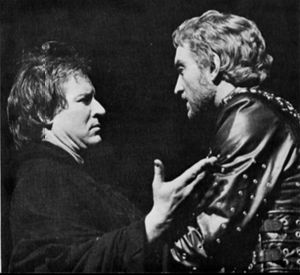 |
The way that Coriolanus makes it happen at the
end throws Aufidius. Coriolanus ensures that it gets out of hand. The clean
stroke is all right, but the treading to death looks ghastly. Coriolanus cries,
"Come on, all do it, all do it", and the speech heading on "Kill, kill, kill,
kill, kill" is "all Con". Aufidius of course has lied, he has not
writ his annals true. Does he perhaps go mad trying to write his history,
afterwards?'
Howard said that he used to think the ending of
the play, as a comment on love, very pessimistic, as if it were saying that
there cannot be pure love, that love does ask for compromise, negotiation,
obligations. Coriolanus' mother is trying to pull him, and it seems he dies for
those sorts of reason, and Howard found it depressing. Then he realised that
Coriolanus dies in a kind of exhilaration, as a creature from a different
sphere: as if he had been someone far beyond even the superman, and he has to
go back to the strange people he came from. His trip has ended, and he has to
return - perhaps to Mars? - leaving the mayhem behind that the others have
created. No father is ever mentioned - it is as if his mother bore him alone,
almost like the virgin birth of a god: and Coriolanus is attended by three
women everywhere, making a sort of pietà.
It is, Howard reiterated, a very dense play
indeed. He was disturbed lest anyone should think that in a few hours of talk
we had done any sort of justice to the play, or to his thoughts and feelings
about it. 'What Terry did sublimely well was to make the play available, make
the hundreds of options clear, allow the shift and varieties of opinion in the
play to come through.' From the earliest days of working on it, they had all
been aware of the movements inside the play, which seemed to be of two kinds.
An event happened, or something was said, which coming a moment earlier or a
moment later would have fixed a direction, but as it was, it just did not do
it.
Similarly, they all found that they would find
a firm position to talk about a matter, which would then hold for only about
twenty lines. 'The play has been done such a disservice in the past: people
have approached it with a mind made up, which is wrong, even though it is
invitingly full of concrete images - "stone walls", "one nail" - which describe
a fixed world as well - that world of T.S. Eliot's poem.'
' There is something of Coriolanus in every
single person: a romantic desire to get on with what I want to do, making
possibilities against a gathering beaurocracy, a human instinct for emphasis on
the individual's rights, yet still within a society. This is something deeply
in the Christian mythology. It would be very interesting to see what would
happen if Coriolanus were to be played in a Buddhist
society.'
He now found the end equally disconcerting, in
that the play was thrown into the laps of the audience, asking 'What are you
going to do about it?' 'It is not the ending of Hamlet. It is more the
world of Earl Mountbatten's funeral: we are all asked to assist. Everyone has
been guilty and not guilty; everyone acting for the right reasons and for the
wrong reasons. The people who go wrong in the play, who make the tragedy, are
not aware of events perpetually moving: too many people are in a position of
stone. What's bleak is that you can't absolutely point the finger at anyone
else. We are never let off the hook: everyone in the firing squad has
live bullets. Talking to people afterwards, some of the audience, actors,
friends, I found that they were left in a very peculiar state of extreme
exhilaration and exhaustion, unhappy and hopeful, emotions heavily engaged,
trying to work out what was right or wrong.' |
